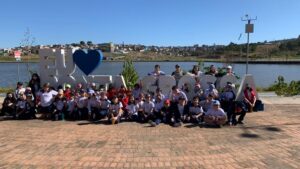News . Best Practices SUSTAINABILITY – Citizenship and partnership for a better city

This best practice report details an open schooling initiative called CONNECT PUCPR, developed by the team from Alfa Ponta Grossa College – Early Years of Elementary Education – led by Coordinator Regina Liberato Shibuta and teachers Ana Claudia Maia, Paola Soares, Silvia Siqueira, India Nara Binotto, and Mariane Bueno during cycles 2 to 5 of the 2022 academic year (04/04/2022 to 20/09/2022). The activities included a science professional, specialist teacher Ana Claudia Maia, professor, and doctor Rodrigo de Cassio da Silva, from the State University of Ponta Grossa, Department of Biology, Andréia Aparecida de Oliveira, geographer and coordinator of the Environmental Education Center at Lago de Olarias. The partnership was supported by the research group PRAPETEC of the Pontifical Catholic University of Paraná, led by professor doctor Patrícia Lupion Torres. This practice was previously presented at Connect (connect-science.net). We used the open scenario method, with students from 3rd, 4th, and 5th grades of the early years of Elementary Education participating.
“CARE” Phase: Students brought up themes such as combating COVID; recycling; conservation of city gardens; care for local squares, and the most popular topic was the Lago de Olarias, a public park recently inaugurated in the city, which has brought much development to the lake area. It is a project still in development and has caught the children’s attention for the care and development of the city. Real-life problems were discussed in groups, where students could contribute ideas and knowledge they brought from home, through the discussions they had with their families. They contributed historical facts, family memories, and many different knowledges. This caught the attention of students who brought other subjects. The fact that the lake is a new place in the city and is still in development, drew even more attention from the students. They were interested in understanding how they could contribute to the care of the place. The students who participated in the activities were from 3rd, 4th, and 5th grades of the early years of Elementary Education. Approximately 230 students.
“KNOW” Phase: Students used their knowledge about pollution, watersheds, groundwater, riparian forests, relief, sustainability, recycling, citizenship, among others. The most interesting stages were the initial discussion; preparing questions for the specialists and for a lecture with the former mayor who inaugurated the place; visiting the site and developing hypotheses to solve the problem of stream pollution.
“DO” Phase: In the end, students prepared a community awareness campaign about the source of the waters feeding the city’s main lake. They developed pamphlets and videos with messages of care and social responsibility. The activities were completed in groups and supported by the school and social community, such as local volunteers, politicians, among others.
Findings related to the Open Schooling approach: The activity used the open scenario method, conducted according to the responses that came from the participants. The curriculum was relevant and engaging, and teachers felt challenged, as they needed to acquire knowledge as doubts and questions arose. Open schooling can be very useful for other teachers because it expands the school curriculum, brings lightness and reality to the presented content, brings information and support for the continuous training of teachers, and makes 21st Century Education happen in the classroom.
Students’ outcomes: The students’ results showed involvement and interest throughout the project, including proposing new problems and developing projects that will become annual projects in our school environment. Talking about pollution and water distribution brought an interest in energy consumption, renewable and non-renewable sources, and a general sense of responsibility for the school community. For example, one student mentioned, “how good it is to be in a school that cares and helps us make a difference in our local community.”